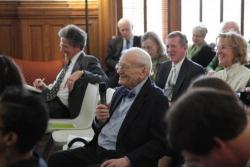RIP Frank Mankiewicz, coiner of "retronym"
« previous post | next post »
 From the New York Times obituary for Frank Mankiewicz (son of Herman, nephew of Joseph):
From the New York Times obituary for Frank Mankiewicz (son of Herman, nephew of Joseph):
Frank Mankiewicz, a writer and Democratic political strategist who was Senator Robert F. Kennedy’s press secretary, directed Senator George S. McGovern’s losing 1972 presidential campaign and for six years was the president of National Public Radio, died Thursday at a hospital in Washington. He was 90.
Mankiewicz was also a bit of wordsmith and coined a useful word now found in many dictionaries: retronym, defined by the OED as "a neologism created for an existing object or concept because the exact meaning of the original term used for it has become ambiguous (usually as a result of a new development, technological advance, etc.)."
The first print appearance of retronym was in William Safire's July 27, 1980 "On Language" column in the New York Times Magazine:
A new form of compound word has been created to help old words avoid technological displacement.
Consider the word "guitar." In olden times, you could play a Spanish guitar or a Hawaiian guitar, but your instrument was accurately denoted by the single word "guitar."
Along came the electric guitar. No longer could you say, "He plays the guitar," for fear of being immediately asked, "What kind — the electric guitar or the old-fashioned guitar?" Since people do not like to be old-fashioned, especially in the music world, players of "regular," or nonelectric, guitars have come to call their instruments "acoustic guitars."
Similarly, "natural turf" is the phrase now being used by sportscasters to differentiate that old-fashioned field from "artificial turf." Another word for natural turf is "grass"; we can soon expect all signs to read: "Keep off the natural turf."
Frank Mankiewicz, president of National Public Radio, collects these terms and calls them "retronyms" — nouns that have taken an adjective to stay up-to-date and to fend off newer terms.
Safire was grateful for the coinage, though he couldn't resist a little dig at NPR: "Thank you, Mr. Mankiewicz; but I am still a devotee of private radio." He returned to the topic in a 2007 column after Merriam-Webster named retronym its Word of the Day and credited Mankiewicz. Safire wrote, "I'm glad Frank is getting mintage recognition on his word to illuminate social and fashion change because his father, Herman, never got the fame he deserved for co-writing the screenplay of 'Citizen Kane.'"
I had the opportunity to meet Mankiewicz in 2012 at the NEH press conference celebrating the completion of the Dictionary of American Regional English, at which I was privileged to speak alongside DARE editor Joan Houston Hall. He was invited to share the story about how, after his friend Safire introduced him to DARE, he used it to clear up some confusion about the word commode in a congressional investigation of government expenditures. It turned out the $1,200 that Stanford president Donald Kennedy spent on an "Italian fruitwood commode" was for a chest of drawers, not a toilet.
I spoke with him a bit about retronyms afterwards, and the first one that he recalled noticing was "natural grass" at the beginning of baseball's Astroturf era. (Safire mentioned "natural turf," but "natural grass" is indeed the more common retronym.)
On Facebook, Philip Frankenfeld shared another one of Mankiewicz's neologisms — less successful than retronym but no less creative:
He coined the term "klonk"–an unforeseen, negative, boomeranging consequence of a well-intended act. The type of thing that makes one say, "D'OH!!!!" A klonk wonk is one who tries to foresee klonks, and who tries to avoid them prospectively. A klonk wonk is one who practices "D'OH!!!!!" diligence.
Graeme said,
October 26, 2014 @ 4:19 am
'Hetero / straight marriage' must be contenders for future Retronym of the Year.
At least in Australia, they tend to be used in the abstract and only in legal debate or by marriage equality activists – are they entering more common parlance elsewhere, to specify specific M/F couplings, where marriage laws have been relaxed?
Aaron said,
October 26, 2014 @ 7:15 pm
@Graeme
In the US, opponents of same sex marriage have coined the retronym "traditional marriage", which of course carries an implication of disdain. I can't specifically remember anyone saying it (or something more neutral like "straight/hetero marriage") in casual, non-political conversation, but I wouldn't be surprised.
bevrowe said,
October 26, 2014 @ 9:49 pm
I (Brit, 79) have always gone to a "station" to catch a train. If I wanted a bus i would expand to "bus station". I now hear "train station" used by younger people and the media. I think this is adopted from US English but I'm far from sure.
RobertL said,
October 27, 2014 @ 3:37 am
I suspect that a lot of people only realised that their TV had a cathode ray tube after plasma and LCD models came onto the market.
Alan Palmer said,
October 27, 2014 @ 7:01 am
I've noticed the same (British, 66), bevrowe . If we had to differentiate we'd say 'railway station' not train station'.
Kyle M said,
October 27, 2014 @ 9:39 am
@bevrowe: I would assume that the word "station" predates trains. Perhaps "train station" or "railway station" came first, then was shortened in common usage, but then as bus stations became more popular, "train station" re-emerged as a special kind of retronym? Do we have a word for that?